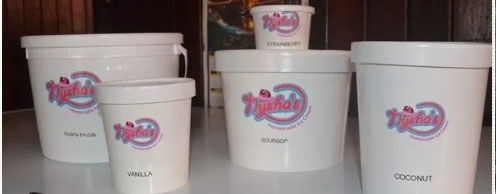There appears to be no end to the profusion of creativity and inventiveness that pervades Guyana’s manufacturing sector, particularly in the area of condiment and beverage production, though the limited rewards for what continues to be the sustained and mostly successful efforts of the producers continue to be undermined by the customer limitations of the local market and the difficulties which locally manufactured products have been experiencing in breaking into overseas markets.
The other notable feature of creativity in the local productive sector is its tendency to materialise in what sometimes are, the less than likely places.
Tucked away at Lot 5, Roxanne Burnham Gardens, Greater Georgetown is Nysha’s Homemade Ice Cream. Its owner is not just an emerging entrepreneur but, arguably an unlikely one, her substantive talents inclined, it might seem, towards academia rather than entrepreneurship.

The proprietor of Nysha’s Home Made Ice Cream is Sharlene Roberts, a Chemistry Lecturer at the University of Guyana who launched the enterprise more than two years ago when she was ‘between jobs’. She had, for nine years prior, worked in the Food Production Department at Sterling Products Ltd. where she was exposed to the development of new products including yogurt and ice cream, an experience that doubtlessly impacted on her own current pursuit.
Sharlene had joined Sterling Products in 2006 as a Technical Assistant in the Quality Assurance Department, and had risen to the position of Business Development Manager (Ag)/ Corporate Social Responsibility Coordinator before parting ways with the company in 2015.
Between jobs Sharlene found herself engaged in restaurant ‘hopping’, recommending places to eat and menus. At home, she turned her attention more fixedly to her own kitchen, probing new recipes. It was during this culinary adventure that she decided to have a tilt at making ice cream.
Her first port of call in her experimental business venture were her parents. Lynette Roberts, her mother, was pressed into service as a Kitchen Assistant. Her businessman father, Terrence, agreed to provide the startup capital. On the matter of the reimbursement of the ‘loan’ she is coyly evasive. Sharlene’s acquisitions in relation to her ice cream venture include various coolers, a freezer and an industrial ice maker for the purpose of producing ‘in volumes’.
Her favoured marketing ploy embraces tales associated with ‘ice cream like our grandmothers used to make it’, her product taking advantage a range of flavors including vanilla, soursop, rum and raisin, chocolate, cookies and coconut, among others.
Guyanese, however, can be ‘tough customers’, and during the formative period, the patronage of relatives, friends and church members notwithstanding, sales were secured largely through so-called taste-and-buy transactions which meant that portions of ice cream had to be ‘served up’ at no cost before cash purchases were made.
Quality, she believes, has won through and over time Sharlene has secured a modest but pleasing niche in the ice cream market as her flavours have become popular at staff meetings and among adults as well as children at birthday parties, wedding anniversaries and other events. Christmas, Mash, Easter Mondays and Mothers’ and Fathers’ Days bring encouraging windfalls.
Sharlene markets her product primarily through her Facebook Page and most of her sales materialise through orders. Her ‘treats’ can be had at $300 per quarter pint cup, $800 per one pint cup, $2,500 per half-gallon container and $5,000 per gallon container.
Nor is her’s the first example of a Guyanese pressing academic knowledge into an entrepreneurial pursuit. A graduate of St Margaret’s Primary School and North Georgetown Secondary School, she pursued the disciplines of Biology, Chemistry and Physics, at a private institution following which she undertook a two-year Diploma Course in Science at the Government Technical Institute, an accomplishment that rendered her eligible for entry into the Natural Sciences Faculty of the University of Guyana to pursue a degree in Chemistry. Her studies at UG, she points out, included elements of Food Science which, over time, she has infused into her current business pursuit. Between 2010 and 2012 she pursued a Masters’ Degree in Food Science and Technology at the St. Augustine Campus of the University of West Indies and in 2015 she completed a Master’s Degree in Business Administration.
Not surprisingly, her academic training has also provided her with the requisite skills to negotiate with farmers in the process of acquiring fruit for her various flavors. Over time, she has developed the skills necessary to acquire the best available fruit, mindful of the food safety challenges associated with utilising spoilt fruit. Sharlene believes that while most if not all fruit can be used in the manufacture of ice cream, sweet fruit are ideal for the purpose. Because sour fruit is acidic, she says, preparation takes longer since their acidic content compromises the proteins in the milk.
If she is mindful of overseeing the growth of her business, Sharlene remains committed to academia, her role as a Chemistry lecturer to more than two hundred students, being an integral part of her life. The requirement of combining the two, she says, has strengthened her resolve to be disciplined and dedicated. She has grown used to working long hours, combining her commitment to the University of Guyana with her growing enthusiasm for entrepreneurship, the latter encouraged by the incremental success that she has realised.
Ms Roberts is understandably cautious about sharing her recipes but was prepared to say that she does not use any custard powder or eggs. Her product has a refrigerated shelf life of three months, a guarantee which she says is based on scientific testing. Its quality has also been tested at different temperatures.
Thinking perhaps of market expansion prospects, she has taken her ice cream on a ‘test run’ to New Amsterdam and apparently, it went well.
Engagements with farmers during the process of selecting fruit for her ice creams is, as much as anything else, an interesting aspect of her work. She has selected her farmers carefully conscious of the fact that the quality of her end product depends on the quality of the raw materials. Damaged fruit can spoil entire batches of ice cream by altering the intended flavour.
Evidently, Sharlene thrives as much on her own confidence as on the heartening market response which her ice creams have encountered. She appears, however, to be mindful not to get ahead of herself, mindful of the fact that successful entrepreneurship goes way beyond simply being able to produce tasty ice cream.
